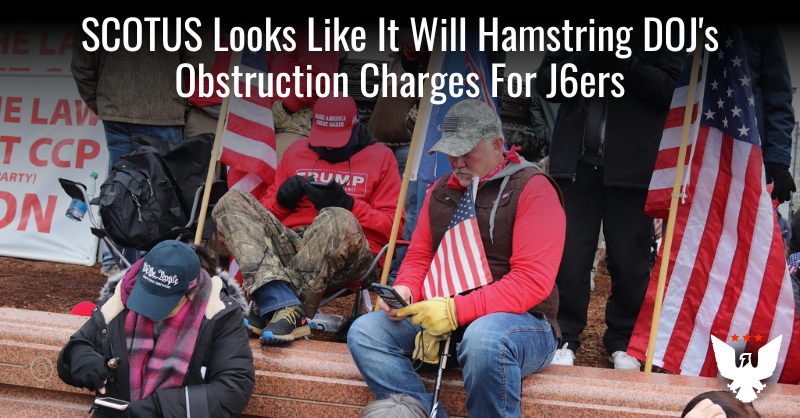SCOTUS Looks Like It Will Hamstring DOJ's Obstruction Charges For J6ers
By: Leslie McAdoo Gordon



The Supreme Court heard arguments Tuesday morning in the case of Fischer v. United States, one of the many criminal cases arising out of the Jan. 6, 2021, riot at the U.S. Capitol. Like defendants in a large subset of those cases, Joseph Fischer was charged, among other offenses, with obstruction of an official proceeding under 18 U.S.C. 1512(c)(2). Fischer's case in the Supreme Court challenges whether the events of that day can be prosecuted using this obstruction statute.
Most of the justices seemed dubious, or at a minimum concerned, about the Department of Justice's very broad interpretation of the statute allowing it to sweep in the kinds of conduct that Jan. 6 encompassed. If the court rules for Fischer, his case will automatically apply to all Jan. 6 cases that include a Section 1512 charge and radically change those cases, including the prosecution against former President Donald Trump in D.C. In virtually all instances, such a ruling would likely require that the Section 1512 charges be dismissed outright.
There are a number of different obstruction statutes in the U.S. code, but none of the others apply to Jan. 6. And Section 1512 itself is largely aimed at other sorts of conduct. Subsection (a) prohibits killing or using physical force or threats of force against individuals to affect their testimony or evidence they might have. Subsection (b) prohibits the same sort of obstructive conduct where the person uses intimidation, corrupt persuasion, or misleading conduct toward the witness.
Subsection (c), at issue here, was enacted after the Enron scandal and was aimed primarily at preventing people from destroying or altering their own documents to obstruct an official proceeding. Subsection (c)(1) is clearly limited to impairment of "records, documents, and objects" for use in official proceedings. Subsection (c)(2) criminalizes "otherwise" obstructing official proceedings.
Fischer's lawyers urged the high court to also restrict the (c)(2) subsection to situations that involve the impairment of evidence that is to be or could be presented in a formal proceeding, which they assert did not occur on Jan. 6. They argued that the conduct covered by (c)(2) must be similar to the conduct covered by (c)(1), which is clearly limited to impairment of "records, documents, and objects" for use in official proceedings.
Fischer's lawyers pointed out that ordinarily, the court interprets statutes with two subsections to mean the second section prohibits conduct that is different from, but similar in kind, to the conduct described in the first section.
By contrast, the government's counsel argued that (c)(2) is meant to cover a much broader range of conduct because it should be interpreted as a "stopgap" or "backstop" provision that sweeps into the statute things that are not expressly covered by (c)(1) or elsewhere in the other sections of 1512. The solicitor general explained that other features of 1512 and the way DOJ applies criminal obstruction statues, such as the mens rea requirement that the conduct be "corrupt," that there must be a "nexus" to an official proceeding, and that DOJ does not prosecute "de minimis" conduct, would serve to narrow the otherwise very broad scope of its interpretation of the language in (c)(2).
In rebuttal, Fischer's lawyer pointed out that DOJ's interpretation, in response to hypotheticals raised by two different justices, would subject peaceful protests to prosecution under this felony statute, which carries a penalty of up to 20 years imprisonment.
Only one justice — Justice Elena Kagan — seemed from her questions at least to be comfortable with the DOJ's interpretation, which would criminalize any "obstruction," "impediment," or "influencing" of an official proceeding in a broad, general way, whether the conduct involved impairment of evidence or not, so long as the DOJ restricted its use of the statute through the other mechanisms the solicitor general described.
Justice Samuel Alito pointedly asked, however, where in the text of the statute DOJ's supposed limiting mechanisms could be found (as only the mens rea of "corruptly" is present in the statutory language). The solicitor general claimed the limitations were "implicit" in the meanings of the words "obstructs, influences, or impedes" and in the requirement that there be an official proceeding. Alito then sparred with the solicitor general for several minutes about what would or would not be "de minimis."
Justice Neil Gorsuch similarly inquired whether pulling a fire alarm to delay congressional voting would be prosecuted by DOJ under this felony, apparently in reference to the actual actions of a member of Congress in September 2023. In his rebuttal argument, Fischer's lawyer pointed out that another provision of 1512 states that the official proceeding need not be in progress or even about to be instituted, eliminating any supposed limiting effect of a "nexus" requirement.
The advocates and justices debated the context and intent of Congress in passing subsection (c)(2), which was enacted after the infamous Enron/Arther Anderson case showed that federal law prohibited getting others to destroy documents, but not destroying them yourself. Justice Ketanji Brown Jackson, in a question that seemed to challenge the government's interpretation, referenced the legislative history of the section, which she said did not seem to indicate that Congress was contemplating conduct beyond the scope of evidence, i.e., the argument Fischer's lawyers were asserting. Both she and Justice Sotomayor pressed the solicitor general for positions or formulations that the court could potentially accept that were less broad than the government's central argument.
The remainder of the justices, to varying degrees, expressed concerns with the breadth of the government's interpretation on technical or conceptual grounds. These ranged from outright sarcasm from Justice Gorsuch, who inquired about "mostly peaceful protests" presumably not being prosecuted, to skepticism from Justice Alito that a coherent line could be drawn for so-called minor conduct, to pointed comments by Justice John Roberts that the solicitor's statutory canon arguments were inconsistent across cases, to queries by Justices Thomas, Kavanaugh, and Barrett about the logic of the solicitor's attempts to reconcile subsections (c)(1) and (c)(2) together to achieve such a broad result.
What is meant or required by the "official proceeding" aspect of the statute was touched upon several times in the argument, but not specifically debated. The technical rules of statutory construction and whether subsection (c)(2) is unconstitutionally overbroad were the main focuses of the argument, at one point with Justice Barrett and the solicitor general agreeing that a defendant could still raise a First Amendment challenge to the statute even under the government's interpretation.
Indeed, a major problem with the government's interpretation of 1512(c)(2) in Fischer is that at base it would repose vast power in DOJ as the arbiter of when conduct rises to the level of obstruction based on factors that are not objectively specified in the statute. It would allow prosecutors to decide to bring an obstruction charge because they "know it when they see it," which is exactly when a statute is usually deemed unconstitutionally vague and overbroad — because ordinary people cannot know what is and is not prohibited.
On balance, the tone of the overall argument and individual justices' questions seemed to lean in favor of a majority of the court (perhaps five and possibly as many as seven justices) rejecting the government's broad reading of 1512(c)(2) and ruling for Fischer that the statute does not apply in the general context of the Jan. 6, 2021, riot at the Capitol.
The precise scope that the court gives to 1512(c)(2), however, could potentially leave open the possibility that a few defendants, including former President Trump, could still be charged under it using a narrower set of allegations. Such a case would then likely bring to the forefront some of the statute's other issues, which were only touched upon briefly in Tuesday's argument, such as the meaning of the "official proceeding" requirement.
Absent extraordinary circumstances, the justices should render their decision and opinion in the case by the end of the current court term, which traditionally closes June 30 of each calendar year.
No personal insults
Keep on Topic (The source is NOT the topic.)
No death wishes of any individual
Post your meme's in YOUR articles.
All of NT's rules apply
Calling members "trolls" or ""dishonest" will result in your comment being deleted.







It's starting to look like the J6 clown show and DOJ overstepped with fraudulent charges.
Great question from Gorsuch about whether this statute applies to pulling a fire alarm to stop a congressional vote. Surprise, surprise the Biden admin says it doesn’t. Apparently, this very broad statute only applies to if you a republican protesting on jan 6th, per the Biden admin,
He called out the hypocrisy of the Democrats. I don't see it ending well for them.
Or protesters interrupting a Supreme Court confirmation hearing because a whore lied about a sexual assault.
I forgot about that.
It sure looks that way ....if one is really a "critical thinker."